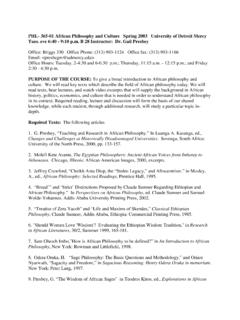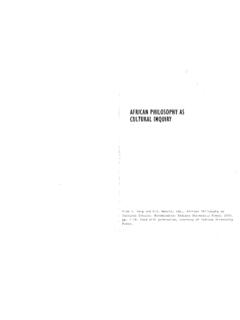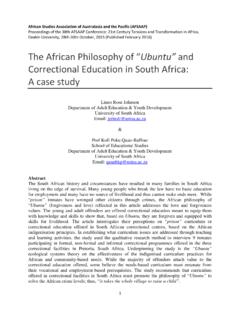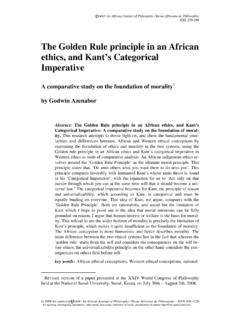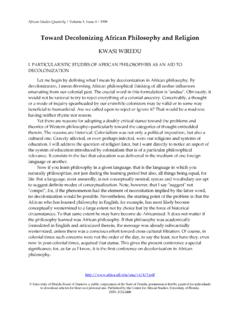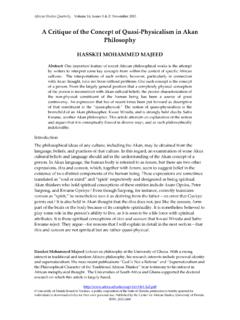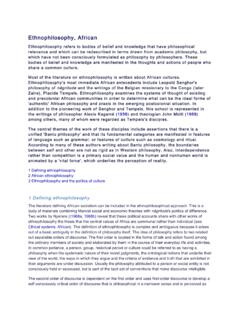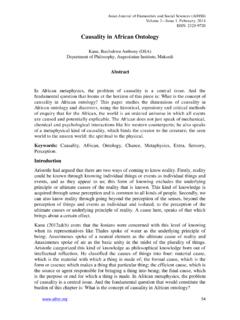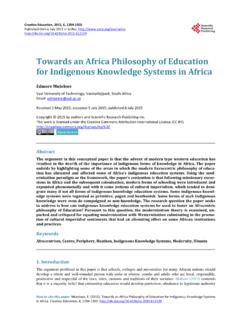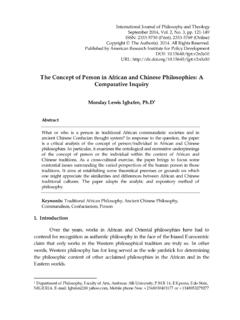Transcription of AFRICAN PHILOSOPHY, GLOBALIZATION AND THE PRIORITY …
1 IGWEBUIKE: An AFRICAN Journal of Arts and Humanities Vol. 3 No 5, July 2017. ISSN: 2488-9210(Online) 2504-9038(Print) (A Publication of the Augustinian Institute) 92 AFRICAN philosophy , GLOBALIZATION AND THE PRIORITY OF OTHERNESS Prof. KANU, Ikechukwu Anthony, Department of philosophy and Religious Studies Tansian University, Umunya Abstract The question of the otherness within the parameters of AFRICAN philosophy oscillates between the concerns of personal identity and alterity. Personal identity deals with the philosophical questions that arise about ourselves by virtue of our being persons. A cursory glance at the historical evolution of philosophy , reveals that it has been discussed since the origins of Western thought, and most major figures have had something to say about it. It is a quest that embodies the value of the first principle of being, which states that every being is determined in itself, is one with itself and is consistent with itself.
2 This notwithstanding, the question of otherness focuses on the relationship between the self and the other. Since this is a study within the scope of AFRICAN philosophy , Igwebuike is employed as an AFRICAN philosophical framework and an indigenous wholistic category to respond to the question of otherness. In the collection and analysis of data, the phenomenological method of inquiry was employed. This research submits that a person, although a separate and separated entity or individual, constitutes part of a complete whole- a diversity of being one with the other, and that the actualization of being is realized in recognizing and relating with the other. The researcher believes that an understanding and appreciation of the AFRICAN conceptualization of the I and other relationship would advance a better human relationship, boost national unity and enhance dialogue between people of diverse religious, cultural and ethnic backgrounds, and thus, reduce violence linked to alterities.
3 Keyword: Otherness, Igwebuike, AFRICAN , Personal Identity, Alterity, GLOBALIZATION , philosophy . Introduction The study of the historical development of Western philosophy and the evolution of AFRICAN thought, unveils an obvious diversity between the Western conceptualization scheme and the AFRICAN conception of reality. Onyeocha (1997) avers that whereas Western philosophy is characterized by the problem of the knowledge of universals involving abstractions on the one , Africans exercise their thinking on the correctness of existence, the problem of living and IGWEBUIKE: An AFRICAN Journal of Arts and Humanities Vol. 3 No 5, July 2017. ISSN: 2488-9210(Online) 2504-9038(Print) (A Publication of the Augustinian Institute) 93 life itself (p. 142). The Western pattern of thought is exclusivistic, depersonalized, objectivised and more concerned with analysis; the AFRICAN scheme of conceptualization is inclusivistic, integrative, non-reductionistic, concrete, personalized and subjectivised in all its manifestations, expressing the interconnectedness of reality- a world of relationship, harmony, continuality and complementarity.
4 Thus, Onyeocha (2006) argues that the AFRICAN conceives of reality in terms of a universe of forces that are linked together, and are in constant interplay with one another (p. 99). This divergence has further structured the AFRICAN and Western conceptions of the human person in relation to the other. In addressing the issue of otherness the dualistic and exclusivistic Western perception of reality understands a person in relation to the other in terms of I and Not-I . This creates a dichotomy that brings in a strong divide between the I and the other , which could set groups and individuals against themselves. The question of the Other is a term with a rich and lengthy philosophical history dating at least from the Sophists through Socrates dialogues to Hegel s dialectics, in which the stranger participates in a dialogue on the ontological problems of being and non-being, of the one and the other.
5 Otherness points to the state of being different, shifting emphasis from Descartes philosophical concerns with the other which was struck in abstraction to a concrete other that is located in social and cultural institutions. The question of the otherness of reality has continued to emerge in the various epochs of the history of philosophy fascinating philosophy and giving rise to questions such as: What does it mean to be other than the self? How do I and must I relate to the other? This paper attempts to study the conceptualization of the relationship between the I and the Other, with particular focus on the human other, within the context of AFRICAN philosophy . That is, how the AFRICAN conceives the self in relation to the other. In responding to this question, Igwebuike would be employed as an AFRICAN philosophical theoretical framework for the interpretation of who am I in relation to the other?
6 The Otherness and Western Philosophical Thought A cursory glance at the historical evolution of the problem of personal identity reveals a couple of perspectives. Conford (1912) and Omoregbe (1991) aver that the Pre-Socratic philosophers (600 BC) were at the base of Western philosophy , which grew out of religion and mythology. These Ionian thinkers agreed that there must be an original stuff of which all things are made. But they disagreed what precisely this primary elements of all things was. For Thales (600 BC), it IGWEBUIKE: An AFRICAN Journal of Arts and Humanities Vol. 3 No 5, July 2017. ISSN: 2488-9210(Online) 2504-9038(Print) (A Publication of the Augustinian Institute) 94 was water. For Anaximander (600-548), it was a neutral element, infinite, eternal and indeterminate. For Anaximenes (528-526 BC), it was air. For Empedocles (440 BC), all things are made up of four everlasting elements: earth, air, fire and water.
7 Their coming together and separation is the cause of the changes we experience in the world. According to Russell (1975), the Pre-Socratics were more concerned with the cosmos, and this affected the development of the concept person during this epoch. However, their interest was also targeted at discovering the unity and permanence of the polarities of the othernesses of their time. With the emergence of the Sophists, there was a shift in the direction of Western philosophy . Stumpf (2000) observes that the human person now occupied a worthwhile place in the western philosophical enterprise. Protagoras (490-420 BC), Gorgias (late 5thcentury) and Thrasymachus (late 5thcentury) are three most outstanding sophists who emerged in Athens sometime during the 5th century. Protagoras, the oldest and most influential Sophist is best known for his teaching that, Man is the measure of all things.
8 Judgments are, therefore, relative. The rise and spread of relativism during this period drew attention to the individual person, and generated a radical approach towards otherness. In the 5th century , Plato (427-347) argues that the human person is composed of body and soul. The soul is a non-material thing and is capable of existence independent of the body. The soul exists before the body does. Kanu (2014) avers that Plato gave more function to the soul, by he emphasizing that the soul is the real person. Since the soul is at the centre of existence, the body, which is the other is treated negatively as an impediment and a prison from which the soul must free itself. In the 4th century , Aristotle (384-322) in his De Anima, taught that every material being is made up of two elements: matter and form. Allan (1970) and Vella (2008) observe that in Aristotle, they are not separate entities as such, but a complex unity.
9 In Aristotle, a more balanced relationship with the other is attained. Augustine (354-430 AD), in his De Trinitate, was the first to take up a deepened examination of the word person. His purpose was to find a word that would be applied distinctly to the Father, Son and Holy Spirit, without falling into the error of making them three divinities or dissolving their individuality. From the foregoing, Mundi (1985) observes that the person in Augustine is the single IGWEBUIKE: An AFRICAN Journal of Arts and Humanities Vol. 3 No 5, July 2017. ISSN: 2488-9210(Online) 2504-9038(Print) (A Publication of the Augustinian Institute) 95 individual. Three different divine persons, with three different divine responsibilities exist together. Boethius (480 AD) in his De Persona et Duabus Naturis, held that a person is an individual substance of a rational nature (persona est rationalis naturae individual substantia).
10 This later became the classical definition of person. St Thomas Aquinas (1224 AD) after Boethius, in his Summa Theologica, defines a person as the subsistens rationale (a rational subsistent). According to Okon (2010), Thomas Aquinas concept of a person implies: a. It is subsistent by itself, the person exists in himself and for himself, being the ultimate subject possessor of his nature and all his acts and so is the ultimate subject of predication of all its attributes. b. It is separated from others. This notwithstanding, with Rene Descartes (1596-1650 AD), philosophy started a new way, that of gnoseology. He defines the person in relation to self-consciousness. In the Second Meditation, Descartes (1637), through his methodical doubt, discovers that something resists doubt. That is, the fact that it is he who doubts, and who can be deceived.

